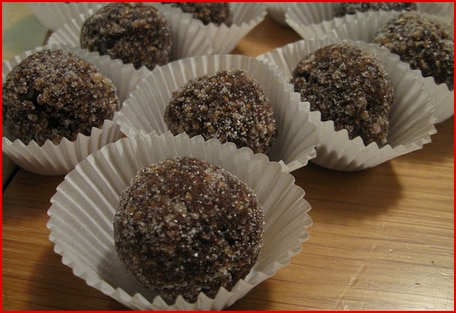
Childhood Obesity News has talked before about how so many different cultures have been similar, all over the globe and throughout history. Human societies mark important days with food. If resources allow it, holiday food is richer and sweeter than plain old everyday grub, and more plentiful. The association of celebration with feasting is one of humankind’s oldest social phenomena, and that link will not be broken any time soon.
Jill Escher is working to bring about a sugar-free Halloween, which just might have a chance. Is anyone brave enough to promote the idea of a Christmas without sweets? Good luck with that one!
This information comes from a university’s human resources department policy guide:
The so-called ‘December dilemma’ refers to the month in and around which there are many religious holidays, including the eight-night Jewish celebration of Hanukkah and the Islamic holidays of Eid al-Fitr, Ramadan’s gift-giving festival, and Eid al-Adha or Feast of Sacrifice; Christmas; the non-religious African-American holiday of Kwanzaa; the Hindu Pancha Ganapati Festival; and the Wiccan Yule, observed on the winter solstice.
“December dilemma” is an accurate phrase for the consciousness of anyone who is concerned about childhood obesity, too. Kids and adults run up against tons of edibles that are fancy, calorie-laden, and, in many cases, free. In the famous poem by Clement C. Moore, “A Visit from St. Nicholas,” the children go to sleep and “visions of sugarplums dance through their heads.”
Traditional sugarplums, by the way, were made of minced fruit of all different kinds, molded into balls, as in the photo, and rolled in — what else? — sugar. And do check with the administration before sending a child to school with Christmas treats to share. From the nation’s schools we get the occasional flare-up of childhood obesity-related news, as when Sarah Palin brings the children cookies, or Mrs. Q the school lunch critic reveals her identity and publishes a book.
Now, schools are having a tough time, in their own version of “December dilemma.” According to a report from Westford, MA:
They’re banning sugary snacks, and sweetened sodas from the celebrations this year.
The spokespeople say it’s not about political correctness or even Christmas, really. And it’s not about taking the joy out of children’s lives, either. The school system is just trying to display leadership and act in a responsible manner, like everybody is always telling them they ought to do.
All of that exists on the physical plane, concerning the food itself and where it shows up, and who gets to eat it. Then, we got advertisers working on our heads. As Dr. Pretlow pointed out, McDonald’s has advertised deep-fried minced chicken as a dish which provides “Comfort and Joy” to its consumer. That’s only one example among zillions, of similar misappropriations of the holiday so flagrant they might be said to border on sacrilege.
On top of everything is another, gigantic layer of psychological complications. As Ellen Granberg says, the big obstacle to remedying childhood obesity is the behavioral stuff, which is very difficult to change.
For example, the insidious thing about Christmas is that it comes just a week before the new year begins. It seems like everybody in America has the same denial-driven mindset about the holidays — go for a big, double-whammy binge blowout over Christmas and New Year’s.
In addition, it seems like everybody in America rationalizes this craziness the same way — we’ve got our New Year’s resolutions written down and folded up in our pocket, and, come January 1, we’ll be on a strict reducing diet and working out five times a week. Yeah, right.
Your responses and feedback are welcome!
Source: “Holiday Guidelines: Using Holidays to Celebrate Inclusiveness,” hr.richmond.edu
Source: “Online Dish: Christmas Cookies Banned from School,” fox26medford.com, 12/21/11
Source: “Those %@#! Comfort Food Commercials,” Fooducate, 04/11/11
Image by Nikchick, used under its Creative Commons license.

 FAQs and Media Requests:
FAQs and Media Requests: 











